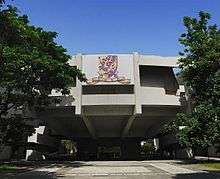Szeto Wai
| Szeto Wai CBE, JP | |
|---|---|
| 司徒惠 | |
| Unofficial Member of the Executive Council of Hong Kong | |
|
In office 1 July 1972 – 1976 | |
| Appointed by | Sir Murray MacLehose |
| Unofficial Member of the Legislative Council of Hong Kong | |
|
In office 19 August 1964 – 19 June 1974 | |
| Appointed by | Sir David Trench |
| Personal details | |
| Born |
10 April 1913 Kwantung, Republic of China |
| Died |
24 July 1991 (aged 78) Paris, France |
| Children | 4 |
| Alma mater |
St. Paul's College, Hong Kong St. John's University, Shanghai |
| Occupation | Engineer and architect |
Szeto Wai, CBE, JP (Chinese: 司徒惠; 10 April 1913 – 24 July 1991) was a Hong Kong engineer and architect. He was responsible for the design and construction of many buildings of the Chinese University of Hong Kong when he was the university architect from 1963 to 1978, therefore was known as the "constructor of the CUHK".[1] He was also an unofficial member of the Executive Council and the Legislative Council.
Education and early career
Szeto Wai was born in Kwantung, China to architect Szeto Yuen. Szeto Yuen was the founder of the Sang Lee Construction Company, a well-known construction company in Hong Kong in the 19th century, responsible for the construction of the Old General Post Office the land reclamation in Wan Chai and the Tai Tam Reservoir.[1]
Szeto Wai received education from the St. Paul's College, Hong Kong and the St. John's University, Shanghai. After he graduated with the degree of Bachelor of Science in 1938, he went on to study in the United Kingdom as a Federation for British Industries Scholar for Engineering Training. He had to stay in Britain as the Second World War broke out and worked in Scotland on water supply schemes and railway engineering. During the years in Britain, he became the president of the Central Union of Chinese Students in Great Britain and Northern Ireland.[2]
Szeto returned to China and arrived in Chungking in December 1945. He was appointed senior planning engineer with the National Hydro-electric Engineering Bureau of the National Resources Commission and chief investigation engineer of the Wongkiang River Hydro-electric Project in Yingtak, Kwangtung. In 1948, he moved to Hong Kong.[2]
Career in Hong Kong

He became a structural engineering consultant to the Public Works Department and the Hong Kong Housing Authority of the colonial government. [2]
He became a part-time lecturer of the Civil Engineering Department of the University of Hong Kong in 1952. He became the architect of the Chinese University of Hong Kong when the university was commenced in 1963 until 1978. During his service, he was responsible for the design and construction of many buildings of the new university, including the Science Building. For his contributions, he received an honorary Doctor of Science by the University of Hong Kong in 1975[2] and an honorary Doctor of Laws degree by the Chinese University in 1978. His other works included So Uk Estate, Choi Hung Estate, Kwun Lung Lau, Kowloon Methodist Church, No. 1 Hysan Avenue, Waterloo Road YWCA Building and the Garden Hotel in Guangzhou.
He was also an honorary architect to the St. John’s Ambulance Association and Brigade, the Red Cross and the Salvation Army. In 1960, he was invited to become president of the Hong Kong Society of Architects.[2]
Szeto was first appointed unofficial member of the Legislative Council of Hong Kong in 1964 provisionally during the absence of Kan Yuet-keung, as the first engineer to serve on the Legislative Council. He became a full-time Legislative Council in 1965 and served until 1974. On 1 January 1972, he was translated to the Executive Council. In 1964, he was appointed an unofficial Justice of the Peace (JP). He was appointed an Officer of the Order of the British Empire (OBE) and a Commander of the Order of the British Empire (CBE) in 1967 and 1974 respectively.[2]
Retirement, death and personal life
Szeto Wai resided in New York City after his retirement in 1987.[1] He died on 24 July 1991 in Paris, France.[3]
He was a painter and held five exhibitions at the Hong Kong City Hall and other venues from 1960 to 1975. He had two sons and two daughters. Besides her eldest daughter being a medical researcher, the other children of his were all renowned architects and worked at the I. M. Pei's architectural firm.[1]